
It is natural to indulge in the illusions of hope. We are apt to
It is natural to indulge in the illusions of hope. We are apt to shut our eyes to that siren until she allures us to our death.






“It is natural to indulge in the illusions of hope. We are apt to shut our eyes to that siren until she allures us to our death.” Thus spoke Patrick Henry, the fiery orator of the American Revolution, whose words cut through complacency like lightning through a storm. In this utterance, drawn from his famous 1775 speech—“Give me liberty, or give me death”—Henry warns his countrymen of a dangerous truth: that hope, when untempered by reason and action, can become not a light to guide, but a siren that lures men to ruin. His was not a rejection of hope itself, but a warning against its illusion, the false comfort that blinds the soul to peril.
When Henry delivered these words, the colonies stood at the edge of war with the British crown. Many still believed that peace could be won through negotiation, that the empire which oppressed them might yet relent through kindness or patience. Henry saw this as a deadly delusion. The “illusions of hope”, he said, were soothing songs sung to keep men asleep while danger advanced. Like the sailors of old who were lured to destruction by the songs of the sirens, the people risked their future by mistaking wishful thinking for wisdom. Thus, in that sacred assembly, he shattered their comfort with the hammer of truth: “We have petitioned, we have remonstrated, we have supplicated. Our petitions have been slighted; our entreaties have been disregarded.” To continue hoping in vain was to surrender to death disguised as peace.
This quote, therefore, was born not from despair, but from courageous realism. Henry did not despise hope—he revered it when it was joined with action. His warning was against the kind of hope that dulls the will, that whispers to the heart, “All will be well if only we wait.” Such hope, unguarded by truth, becomes the sweetest poison. The ancients spoke of this same danger. The Greeks told of Odysseus, who heard the sirens’ song as his ship neared their isle. Their music was beautiful beyond words, promising knowledge and bliss—but hidden beneath the melody was death. Only by binding himself to the mast could Odysseus resist the temptation to steer toward destruction. So too, Henry counseled his people: bind yourselves to truth, lest you be lost to the song of false hope.
The lesson resounds through every age. In times of oppression, in times of moral decay, or in the quiet struggles of the soul, men and women are tempted to believe that change will come without effort, that time itself will heal what courage must confront. Yet, as Henry saw, truth demands struggle. The farmer cannot hope his field will yield without planting; the nation cannot hope for freedom without sacrifice; the heart cannot hope for peace while refusing to face its shadows. Hope alone is not enough—it must be anchored in action and guarded by the eyes of reason.
History offers many examples of those who learned this truth too late. Consider the fall of Rome, when senators comforted themselves with illusions of stability even as the empire decayed from within. They heard the warnings of the wise, yet chose the ease of denial. Their hope—that the old glory would sustain them—was the siren that led them to ruin. Or look to the fate of nations in our own time, lulled into complacency by promises of progress while injustice festers beneath. The illusion of hope, when it blinds us to reality, becomes a silent conqueror, more dangerous than any sword.
Yet Henry’s words do not command us to abandon hope, only to purify it. True hope is not a dream that shields us from truth; it is a flame that burns because of truth. It is the courage to face what is, and still believe in what can be. The man of wisdom does not shut his eyes to danger; he opens them wider, and then acts with strength. In this sense, Henry’s quote is both a warning and a call to arms—for his generation and for all who live in times of moral sleep. The false hope of comfort leads to decay; the true hope of conviction leads to renewal.
So, my child of the future, take this teaching to heart: beware the illusions of hope that promise peace without effort, success without labor, or justice without sacrifice. Do not let your heart be lulled by the sweet voice of the siren that says, “Wait, all will be well.” Instead, rise. Bind yourself to truth, as Odysseus did, and steer through the storm with open eyes. Let your hope be clear-eyed and steadfast, not soft and sentimental. Act upon it, fight for it, suffer for it if you must. For only when hope and action walk hand in hand can humanity escape the rocks of destruction and find the shores of freedom.
Thus, remember the wisdom of Patrick Henry: that the most dangerous illusion is not fear, but false comfort. Hope that blinds is no hope at all. Hope that awakens, that stirs the heart to bravery and the hands to labor—that is the hope that builds nations, redeems souls, and keeps the human spirit from perishing in the song of its own delusions.






AAdministratorAdministrator
Welcome, honored guests. Please leave a comment, we will respond soon